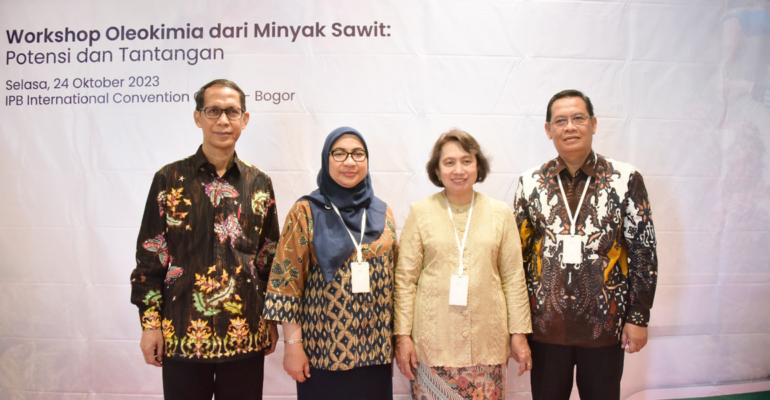SBRC IPB University, BPDPKS and PT INL Discuss Downstreaming of Palm Oil into Oleochemicals

The growth of the domestic industry for palm oil derivative products in the form of Oleochemicals is a big hope from the workshop held in collaboration with the Surfactant and Bioenergy Research Center (SBRC) of IPB University together with the Palm Oil Plantation Fund Management Agency (BPDPKS) and PT Industri Nabati Lestari (INL). The event was held at the IPB International Convention Center (IIC) with the theme ‘Downstream Palm Oil into Oleochemicals: Potential and Challenges’ (23/10).
Rector of IPB University, Prof Arif Satria in his speech online appreciated this event. According to him, this event is a place to share interesting information on how palm oil derivative products can have added value. He believes that palm oil derivative products will increasingly develop through innovations from universities.
“IPB University has also produced innovations in the form of helmets from palm waste, fashion from palm waste, cosmetics from palm waste, there is feed from palm waste and many more. Including innovations produced through SBRC IPB University,” he said.
In addition, he continued, IPB University has also made a crude palm oil (CPO) processing plant in Jonggol. In 2024 a derivative factory from CPO will be built. “I really appreciate this activity and hope that this collaboration will continue to produce other palm oil derivative innovation products,” he concluded.
The Chief of SBRC IPB University, Dr Meika Syahbana Rusli, said that palm oil is still one of Indonesia’s mainstay commodities in adding to the country’s foreign exchange. CPO or crude palm oil and Palm Kernel Oil (PKO) or palm kernel oil are potential raw materials to be processed into various oleochemical products.
“In addition to contributing to foreign exchange, the palm oil industry also provides large employment opportunities, which can absorb 4.53 million farmer workers,” said Dr Meika.
One of the SBRC IPB University researchers, Prof Erliza Hambali, said that the downstreaming of CPO and PKO that can be done in Indonesia is grouped into three major groups, namely oleopanganese, oleochemicals and biofuels.
In oleochemical downstream, refinery products will be processed into basic oleochemical products up to surfactants and emulsifiers. Some examples of its application can be found in products commonly used in daily life. Such as in cleaning products, personal care, cosmetics, pharmaceuticals, agrochemicals to the oil and gas industry. In addition, oleochemical products also play a role in increasing petroleum production in old fields.
Rapolo Hutabarat from the Indonesian Oleochemical Producers Association (Apolin) revealed that currently there is no domestic industry that produces oleochemicals from downstream palm oil. According to him, this is a challenge for Indonesia as one of the largest exporters of crude palm oil.
He hopes that the Ministry of Cooperatives and Micro, Small and Medium Enterprises (Kemenkop UMKM) can play a role by helping to grow MSMEs downstream of palm oil derivative products. For example, by growing hand washing soap MSMEs.
Meanwhile, Aida Fitria, Chief of the Community Institutions and Civil Society Division of the Partnership Directorate of BPDPKS, said that the government’s support for the downstreaming of the palm oil industry is through the issuance of regulations and policies. One of them is the imposition of higher tariffs on upstream products compared to downstream products.
“Palm oil is included in 10 groups of Indonesian superior commodities that are encouraged by the government to intensify the downstream process and increase its competitiveness. The downstreaming of the palm oil industry, especially for export-oriented industries, is needed, considering that import growth in 2019 was 7.1 percent which was still higher than export growth of 6.3 percent,” she said.
Therefore, she said, through efforts to downstream the palm oil industry, it is expected to increase foreign exchange earnings from palm oil. In the end, the added value of palm oil products can be enjoyed by all stakeholders in Indonesia. (dh/Rz) (IAAS/RUM)


